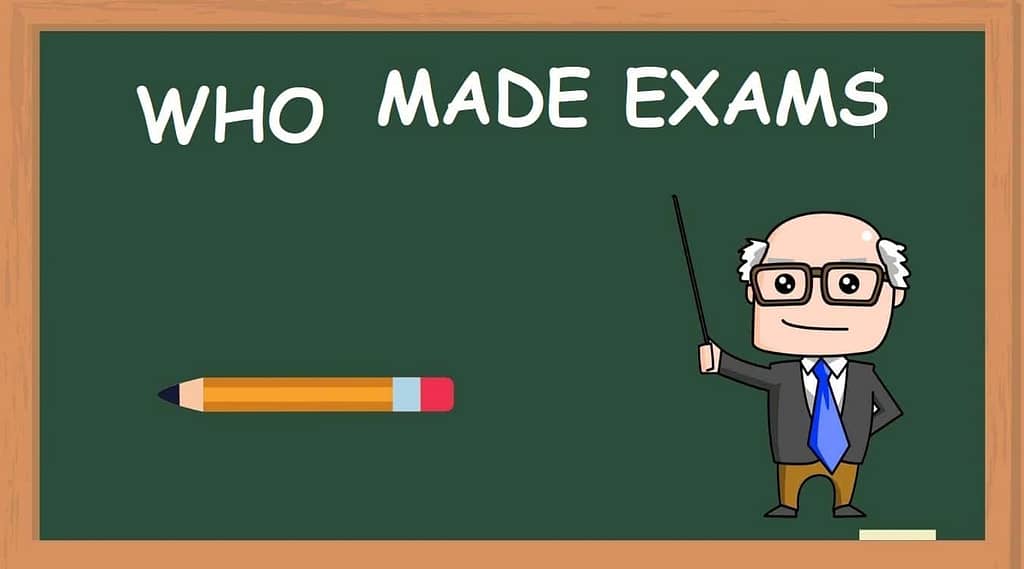Table of Contents
Introduction
In a world where knowledge and expertise are valued, exams have become an integral part of education and professional assessment. These assessments evaluate one’s understanding, skills, and readiness for various challenges. As we delve into the topic of “Who Made Exams?” we’ll explore the history, importance, evolution, and challenges associated with exam creation, along with insights into the psychology behind designing effective exams.

Who Made Exams?
Exams, in their earliest form, can be traced back to ancient civilizations. The concept of assessing individuals’ knowledge dates back to the Chinese imperial exams during the Tang dynasty. These exams were designed to select candidates for government positions based on their knowledge of Confucian classics.
Importance of Exams
Exams serve as a benchmark for evaluating knowledge and skills. They provide a standardized method to measure individuals’ understanding of a subject matter, making it easier to compare and rank candidates objectively. Moreover, exams encourage learning and preparation, fostering a sense of achievement and personal growth.
Historical Evolution of Exams
The evolution of exams has been marked by significant milestones. From the medieval universities’ oral exams to the written assessments of the Renaissance, exams have adapted to the changing needs of society. During the Industrial Revolution, standardized testing gained prominence, shaping modern education systems.
Modern Examination Systems
Contemporary education systems incorporate various types of exams, each tailored to different learning levels and objectives. From standardized tests like the SAT and ACT to vocational assessments, exams have diversified to cater to a wide range of disciplines and professions.
Types of Exams
Exams come in various forms, including written tests, practical assessments, presentations, and online quizzes. The choice of exam type depends on the subject, learning outcomes, and technological resources available.
Role of Technology in Exams
Technology has revolutionized the examination process. Online platforms offer adaptive testing, instant feedback, and remote proctoring. This has increased accessibility and convenience while raising concerns about cheating and security.
Challenges in Exam Creation
Designing effective exams is not without challenges. Exam creators must ensure fairness, validity, and reliability. Addressing cultural biases, preventing cheating, and aligning exams with learning objectives are ongoing concerns.
Creating Effective Exams
To create meaningful exams, educators must align questions with learning goals. Incorporating various question formats, such as multiple-choice, essay, and practical tasks, promotes a comprehensive assessment of students’ knowledge and skills.
Psychology Behind Exam Making
Understanding cognitive processes is crucial in exam creation. Well-structured exams consider cognitive load, question clarity, and the balance between recall and application of knowledge.
Innovations in Exam Design
Innovations like computer-adaptive testing and gamification have enriched the exam-taking experience. These approaches personalize assessments and engage learners in novel ways.
Ensuring Fairness and Validity
To ensure fairness, exams must be devoid of biases and discrimination. Validity, the extent to which an exam measures what it intends to, is maintained through rigorous test development processes.
The Future of Exams
The future of exams is shaped by technology, evolving teaching methodologies, and changing workplace demands. Adaptive AI-driven assessments, e-portfolios, and skill-based evaluations are likely to gain prominence.
Also read Who Invented Exams
FAQs
- Q: Are exams a true reflection of one’s knowledge?
- A: Exams offer a snapshot of knowledge at a given time, but practical application and real-world skills also matter.
- Q: How can technology address cheating in online exams?
- A: Remote proctoring, plagiarism detection tools, and AI surveillance help prevent and identify cheating.
- Q: What’s the role of open-book exams?
- A: Open-book exams assess problem-solving and critical thinking rather than rote memorisation.
- Q: Do exams hinder creative thinking?
- A: When designed well, exams can assess creativity through innovative question formats.
- Q: Are exams biased against certain cultures?
- A: Efforts are made to eliminate cultural bias, but it remains a challenge in standardised exams.
- Q: How do exams impact mental health?
- A: While exams can induce stress, proper support systems and balanced assessment methods can mitigate the impact.
- Q: Can exams assess practical skills?
- A: Practical exams, simulations, and real-life scenarios are designed to evaluate application-oriented skills.
- Q: Are traditional written exams becoming obsolete?
- A: Traditional exams are evolving, with technology enhancing their effectiveness and accessibility.
- Q: How can educators promote positive attitudes toward exams?
- A: Fostering a growth mindset, providing constructive feedback, and emphasising learning over grades can help.
- Q: Are there alternatives to summative exams?
- A: Formative assessments, projects, presentations, and portfolios offer alternative ways to evaluate learning progress.
Conclusion
Exams have come a long way since their ancient origins. They play a vital role in education, career advancement, and personal growth. The process of creating exams involves a delicate balance between assessing knowledge, skills, and practical application. As technology continues to reshape the way we learn and evaluate, exams will likely adapt, ensuring that they remain relevant and effective in shaping future generations.
Please Visit Our Website For Information – Infowalay
